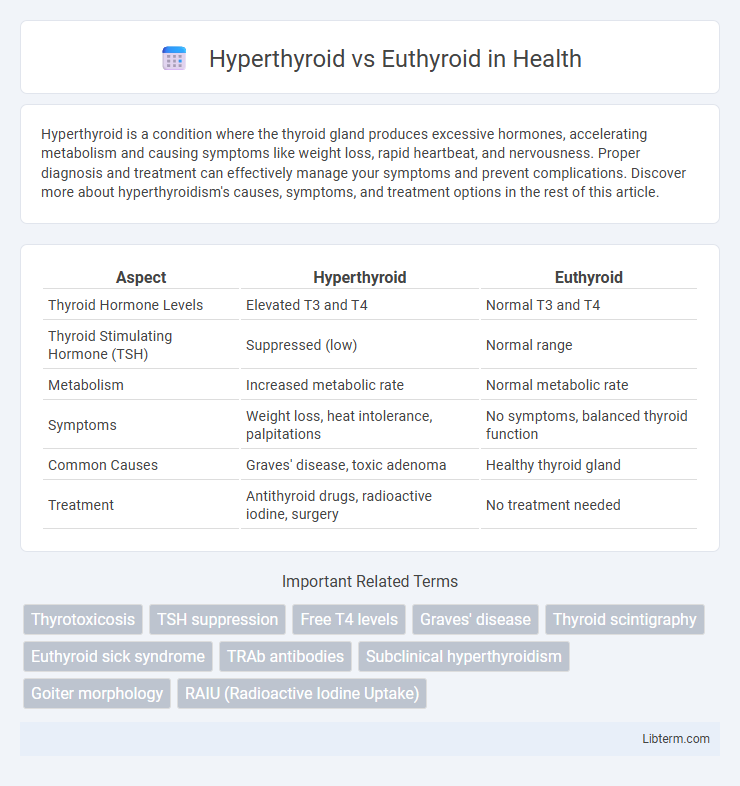Hyperthyroid is a condition where the thyroid gland produces excessive hormones, accelerating metabolism and causing symptoms like weight loss, rapid heartbeat, and nervousness. Proper diagnosis and treatment can effectively manage your symptoms and prevent complications. Discover more about hyperthyroidism's causes, symptoms, and treatment options in the rest of this article.
Table of Comparison
| Aspect | Hyperthyroid | Euthyroid |
|---|---|---|
| Thyroid Hormone Levels | Elevated T3 and T4 | Normal T3 and T4 |
| Thyroid Stimulating Hormone (TSH) | Suppressed (low) | Normal range |
| Metabolism | Increased metabolic rate | Normal metabolic rate |
| Symptoms | Weight loss, heat intolerance, palpitations | No symptoms, balanced thyroid function |
| Common Causes | Graves' disease, toxic adenoma | Healthy thyroid gland |
| Treatment | Antithyroid drugs, radioactive iodine, surgery | No treatment needed |
Introduction to Thyroid Function
The thyroid gland regulates metabolism by producing hormones such as thyroxine (T4) and triiodothyronine (T3), essential for cellular energy production and growth. Hyperthyroid states feature excessive thyroid hormone secretion, leading to increased metabolic rate, weight loss, and tachycardia. In contrast, euthyroid conditions reflect normal thyroid hormone levels, maintaining balanced metabolic functions and homeostasis.
Defining Hyperthyroid and Euthyroid States
Hyperthyroid state is characterized by excessive secretion of thyroid hormones thyroxine (T4) and triiodothyronine (T3), resulting in increased metabolic rate and symptoms such as weight loss, heat intolerance, and palpitations. Euthyroid state represents normal thyroid function with balanced production and regulation of T3 and T4, maintaining metabolic homeostasis and stable physiological processes. Diagnostic evaluation of thyroid-stimulating hormone (TSH) levels alongside free T4 and T3 concentrations distinguishes hyperthyroid conditions from euthyroid status accurately.
Causes of Hyperthyroidism
Hyperthyroidism is caused primarily by autoimmune disorders such as Graves' disease, toxic multinodular goiter, and thyroiditis, leading to excessive thyroid hormone production. In contrast, euthyroid refers to a state of normal thyroid function with balanced hormone levels. Understanding the underlying causes of hyperthyroidism is crucial for accurate diagnosis and targeted treatment strategies.
Common Symptoms: Hyperthyroid vs Euthyroid
Hyperthyroid individuals commonly experience symptoms such as weight loss despite increased appetite, rapid heartbeat, anxiety, heat intolerance, and tremors, reflecting an overactive thyroid gland. In contrast, euthyroid individuals exhibit normal thyroid function and typically do not present these symptoms, maintaining stable metabolism, heart rate, and energy levels. Accurate diagnosis through thyroid function tests measuring TSH, Free T4, and Free T3 levels is essential to differentiate hyperthyroid from euthyroid states and guide appropriate treatment.
Diagnostic Methods for Thyroid Status
Hyperthyroid diagnosis relies heavily on elevated serum free thyroxine (FT4) and triiodothyronine (FT3) levels coupled with suppressed thyroid-stimulating hormone (TSH) concentrations, detected through sensitive immunoassays. Euthyroid status is confirmed when TSH and thyroid hormone levels fall within reference ranges established by assay standardization, indicating normal thyroid gland function. Imaging techniques such as thyroid ultrasound and radioactive iodine uptake scans further refine diagnosis by revealing gland morphology and functional activity distinguishing hyperthyroidism from euthyroid conditions.
Hormonal Differences: TSH, T3, and T4 Levels
In hyperthyroid conditions, TSH (thyroid-stimulating hormone) levels are significantly suppressed due to negative feedback from elevated thyroid hormones, with T3 (triiodothyronine) and T4 (thyroxine) levels markedly increased, reflecting excessive thyroid gland activity. Conversely, in euthyroid states, TSH, T3, and T4 levels remain within normal reference ranges, indicating balanced thyroid hormone production and stable metabolic function. The distinct hormonal profiles between hyperthyroid and euthyroid conditions are critical for accurate diagnosis and targeted treatment strategies.
Impact on Metabolism and Body Systems
Hyperthyroid condition accelerates metabolism by increasing thyroid hormone production, leading to symptoms such as weight loss, rapid heartbeat, and heat intolerance due to heightened cellular activity. In contrast, euthyroid individuals maintain normal thyroid hormone levels, supporting stable metabolic rate and balanced function across body systems including cardiovascular, nervous, and digestive systems. Disruptions in metabolism from hyperthyroidism can cause systemic effects like muscle weakness, osteoporosis, and increased energy expenditure, whereas euthyroid status preserves homeostasis and physiological equilibrium.
Treatment Approaches: Hyperthyroid vs Euthyroid
Hyperthyroid treatment approaches include antithyroid medications like methimazole, radioactive iodine therapy, and sometimes thyroidectomy to reduce excessive thyroid hormone production. Euthyroid patients typically require no treatment as their thyroid hormone levels are normal, but regular monitoring is essential if thyroid function changes occur. Managing hyperthyroidism also involves symptom control with beta-blockers to address cardiovascular effects, a step unnecessary in euthyroid individuals.
Long-term Health Implications
Hyperthyroid conditions, characterized by excessive thyroid hormone production, significantly increase risks of atrial fibrillation, osteoporosis, and muscle weakness over time. Euthyroid states maintain balanced hormone levels, supporting stable cardiovascular function, bone health, and metabolic processes. Long-term management of hyperthyroidism is critical to prevent complications such as heart failure and accelerated bone loss compared to euthyroid individuals.
Preventive Measures and Regular Monitoring
Maintaining a balanced iodine intake and avoiding excessive thyroid-stimulating substances are crucial preventive measures against hyperthyroidism, while regular thyroid function tests, including TSH, Free T4, and Free T3 levels, enable early detection and management. Patients with hyperthyroid conditions should monitor symptoms such as rapid heartbeat and weight loss to adjust treatment promptly, whereas euthyroid individuals benefit from annual screenings to ensure thyroid hormone levels remain stable. Consistent evaluation through ultrasound imaging and antibody testing helps in differentiating autoimmune causes and preventing progression to overt thyroid disease.
Hyperthyroid Infographic

 libterm.com
libterm.com